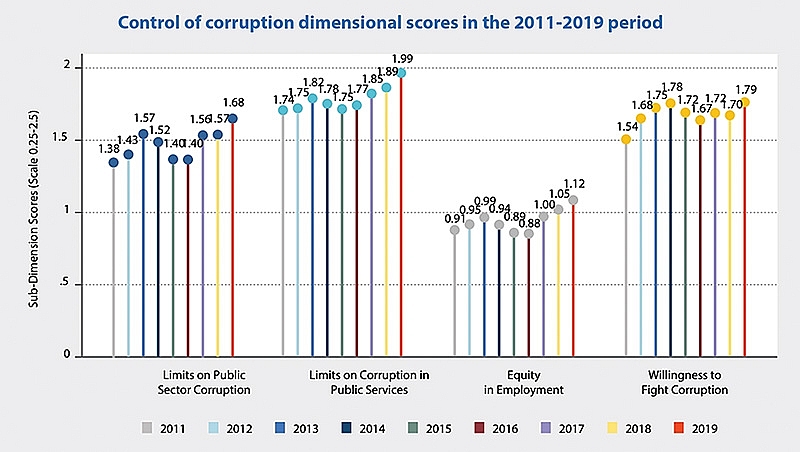Anti-corruption charge in Vietnam commended
 |
Last week, news of the Vietnamese government’s ongoing success in combating corruption was revealed via the United Nations Development Programme (UNDP) releasing its annual Provincial Governance and Public Administration Performance Index (PAPI), a policy monitoring tool assessing citizen experiences and satisfaction with government performance at the national and sub-national levels in governance, public administration and public service delivery.
PAPI 2019 data surveyed more than 14,000 citizens from all 63 provinces nationwide, and a UNDP press release stated that in 2019, “the greatest progress was made in the dimension on enhancing control of corruption in the public sector (which is most strongly correlated with overall citizen satisfaction) and increasing transparency in local decision-making. This matches well-documented reform efforts spearheaded by the high-profile anti-corruption campaign.”
The press release went on to pay tribute to Vietnam’s efforts. “Tackling corruption has been a centrepiece of the Party and government efforts, with numerous high-profile investigations over the last few years,” it said. “Consequently, the 2019 PAPI report reflects the clear impact of this anti-corruption campaign on perceptions of grand and petty corruption. This dimension saw the strongest improvements in 2019 at commune and national levels – with 5 per cent more respondents than in 2018 reporting that corruption was decreasing.”
According to the PAPI 2019, while the anti-corruption drive is changing perceptions, there is continued evidence of significant declines in petty corruption, as experienced by citizens in district level public hospitals and when applying for land use right certificates.
While control of corruption scores has improved, a substantial number of respondents (20-45 per cent) continue to perceive corruption as prevalent in the public sector. This suggests that further efforts are needed to address this problem in the coming years.
Vietnam’s anti-corruption campaign was intensified years ago with 2012’s Resolution No.12-NQ/TW of the fourth Central Party Committee Meeting, which targeted improved morality within the Party.
Party General Secretary, State President Nguyen Phu Trong emphasised in a speech in December last year that the campaign would continue into 2020, and several high-profile investigations in 2019 confirm the campaign continues.
The government has also issued directives targeted at reducing petty corruption facing businesses and citizens, such as the prime minister’s Directive No.10/CT-TTg on strengthening effective management and prevention of harassment and problems for people and businesses in working performance.
Last week, Prime Minister Nguyen Xuan Phuc ordered a comprehensive investigation over the public procurement of healthcare equipment nationwide, after a related scandal was uncovered in Hanoi.
Investigators from the Ministry of Public Security reported that Nguyen Nhat Cam, director of Hanoi’s Centre for Disease Control, and his accomplices had increased the purchase price for a COVID-19 test kit package by three times, or VND4.7 billion (over $204,000).
PM Phuc recently instructed the Government Inspectorate to launch an urgent investigation into the observance of legal regulations regarding the recent state management of rice exports.
The inspection aims to identify whether or not there are any signs of profiteering or other negative acts taking place, and to strictly handle them in accordance with the law.
In fact, Vietnam was also extolled by the international community for its fight against corruption. The UNDP’s PAPI 2017 revealed significant improvements in five of the six PAPI dimensions compared to 2016. These are ‘Transparency’, ‘Vertical accountability’, ‘Control of corruption in the public sector’, ‘Public administrative procedures’, and ‘Public service delivery’.
| Caitlin Wiesen - Resident representative, UNDP in Vietnam
One of the most important topics being discussed globally today is the wellbeing of people, the responsiveness of governments and public trust in government efforts in combating the COVID-19 pandemic. The Vietnamese government has been praised by citizens and the international community for being anticipatory, agile, and adaptive to effectively curb the outbreak. This is what we call “triple A” governance. The strong leadership, and rapid and transparent measures with priorities placed on public safety have been identified as key factors to boost public trust and support in the government and country leaders. The PAPI research is focused on the same governance principles. The PAPI index highlights the value of citizen engagement and their ability to assess provincial governance and public administration efficiency in responding to the needs and expectations of the people. Over the last 10 years, the PAPI index has collected and analysed the views and experiences of over 130,000 Vietnamese citizens to assess government efforts in promoting grassroots democracy, public administration reform, control of corruption, accountability, transparency, and environmental protection. These are all crucial efforts to help Vietnam achieve sustainable development. The 2019 PAPI report contains many findings, but let me highlight three which I found particularly interesting this year. First, over the two government terms from 2011 to 2019, provincial governance performance has gradually improved. The average provincial scores on the six initial dimensions have increased from 34.5 points in 2011 to 37.4 points in 2019. Virtually all provinces have seen positive annual improvements. In particular, we have seen the most significant improvements in the areas of control of corruption (which is most strongly correlated with overall citizen satisfaction) and transparency in local decision-making. This is a testament to the strong commitment of central and local leaders to improve governance. Building on these improvements, we encourage them to continue to drive these reforms forward. Second, the PAPI findings in 2019 continue to call for long-term attention to the nexus between economic growth, poverty reduction, and environmental protection. Despite Vietnam’s rapid growth rate in recent years, poverty reduction has topped the list of most important concerns while jobs and employment have remained in the top four since 2015. In 2019, poverty was cited by nearly one quarter of PAPI respondents as the most important concern. Citizens without social insurance were more concerned about slipping into poverty and those in the agriculture sector expressed less satisfaction with their household economic situation. Interestingly, the environment has made it back into the top three citizen concerns in 2019. As Vietnam prepares to move to the COVID-19 recovery phase, the vulnerable population might be even more concerned about poverty and job losses caused by the pandemic. The PAPI survey in 2020 will include questions related to the virus’ impact to timely reflect citizens’ concerns and guide policy responses. Third, the 2019 PAPI report shows that further streamlining of administrative procedures and fostering e-governance should be prioritised in the government reform agenda. Respondents have reported that efforts to streamline administrative procedures and implement “one stop shops” have been less impactful for citizens than for businesses. |
What the stars mean:
★ Poor ★ ★ Promising ★★★ Good ★★★★ Very good ★★★★★ Exceptional
Related Contents
Latest News
More News
- Foreign leaders extend congratulations to Party General Secretary To Lam (January 25, 2026 | 10:01)
- 14th National Party Congress wraps up with success (January 25, 2026 | 09:49)
- Congratulations from VFF Central Committee's int’l partners to 14th National Party Congress (January 25, 2026 | 09:46)
- 14th Party Central Committee unanimously elects To Lam as General Secretary (January 23, 2026 | 16:22)
- Worldwide congratulations underscore confidence in Vietnam’s 14th Party Congress (January 23, 2026 | 09:02)
- Political parties, organisations, int’l friends send congratulations to 14th National Party Congress (January 22, 2026 | 09:33)
- Press release on second working day of 14th National Party Congress (January 22, 2026 | 09:19)
- 14th National Party Congress: Japanese media highlight Vietnam’s growth targets (January 21, 2026 | 09:46)
- 14th National Party Congress: Driving force for Vietnam to continue renewal, innovation, breakthroughs (January 21, 2026 | 09:42)
- Vietnam remains spiritual support for progressive forces: Colombian party leader (January 21, 2026 | 08:00)


 Tag:
Tag:


















 Mobile Version
Mobile Version